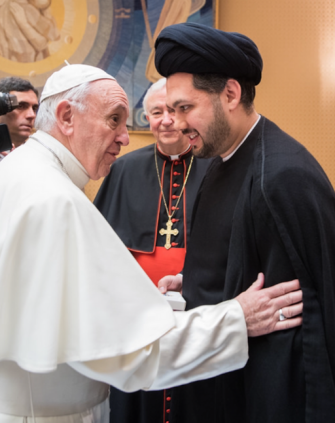Jesus – ‘Isa 4
Bible
The public life of Jesus lasted only three years, but his teaching and his actions during these years fill the Gospels. Little of this is reflected in the Qur’an.
The miracle of the multiplication of the loaves is found in all four of the Gospels: Mt 14:13-21; Mk 6:30-44; Lk 9:10-17; Jn 6:1-15, with an important discourse of Jesus following the event (cf. Jn 6:26-58).
This anticipates the Last Supper of Jesus in which he instituted the Eucharist (Mt 26:17-19, 26-29; Mk 14:12-19, 22-25; Lk 22:7-20). John does not relate the institution of the Eucharist, but he does include the episode of Jesus washing the feet of his disciples (Jn 13:1-17) John follows this with important discourses of Jesus (Jn 13:31-35 and chapters 14-17).
The Last Supper leads up to the Passion, Death and Resurrection of Jesus of which each evangelist gives an account (Mt 26:36 -28:20; Mk 14:32-16:20; Lk 22:39-24:51; Jn 18:1-21:25).
Qur’an
After a passage in surat al-mâ’ida (Q 5:110-111) where God reminds Jesus that it is with God’s permission that he works miracles, there comes a request from the disciples:
When the disciples said, “Jesus, son of Mary, can your Lord send down a feast to us from heaven?” he said, “Beware of God if you are true believers.” They said, “We wish to eat from it; to have our hearts reassured; to know that you have told us the truth; and to be witnesses of it.” Jesus, son of Mary, said, “Lord, send down to us a feast from heaven so that we can have a festival – the first and last of us – and a sign from You. Provide for us: You are the best provider.” God said, “I will send it down to you, but anyone who disbelieves after this will be punished with a punishment that I will not inflict on anyone else in the world” (Q 5:112-113).
Michel Cuypers, who has made a full length study of surat al-mâ’ida, suggests putting this passage in relationship with the discourse of Jesus after the multiplication of the loaves (John 6:20-58) in which Jesus declares himself to be ‘the bread of life’. This discourse ends with the words: “anyone who eats this bread will live for ever” (Jn 6:58). It is to be noted that in the qur’anic text the disciples are asking for something to reassure their hearts; so it could be said that they are seeking spiritual rather than material food. This could be understood as the Eucharist. It is not surprising that there is nothing in the Qur’an about the actual institution of the Eucharist since, as has been noted before, the category of sacrament is absent from the Qur’an.
On the Passion of Jesus there is the following passage:
[The Jews] said, “We have killed the Messiah, Jesus, son of Mary, the Messenger of God.” (They did not kill him, nor did they crucify him, though it was made to appear like that to them; those that disagreed about him are full of doubt, with no knowledge to follow, only supposition: they certainly did not kill him – No! God raised him up to Himself. God is almighty and wise.) (Q 4:157-158).
The phrase shubbiha la-hum, translated here “it was made to appear like that to them” has received many interpretations. The most common is that someone was changed into the likeness of Jesus and was crucified in his place. What is important for Muslims is that Jesus did not die on the cross – this explains the opposition to the figure of the cross and in particular to the crucifix with a corpus on the cross – but God raised him up to himself (see also the verse: “God said, ‘Jesus, I will take you back and raise you up to Me’” (Q 3:55). Muslims believe that Jesus will return at the end of time to prepare the way for a reign of justice and peace.
Fr Robert Caspar, a Missionary of Africa who was an expert on Islam with much experience in relations with Muslims, especially in Tunisia, gave this opinion:
“The qur’anic or Christian Jesus is seldom a meeting ground or the basis for a useful dialogue between Christians and Muslims, even though it seems at first an excellent common ground. There is a great risk of coming up against a brick wall of positions which are clearly defined and irreconcilable, and thus declining into polemic” (Islamic Theology, II Doctrines, p.128).
To be able to express fundamental differences without the exchange developing into a shouting match, an atmosphere of friendship needs to be solidly established.









Make A Comment
Comments (0)